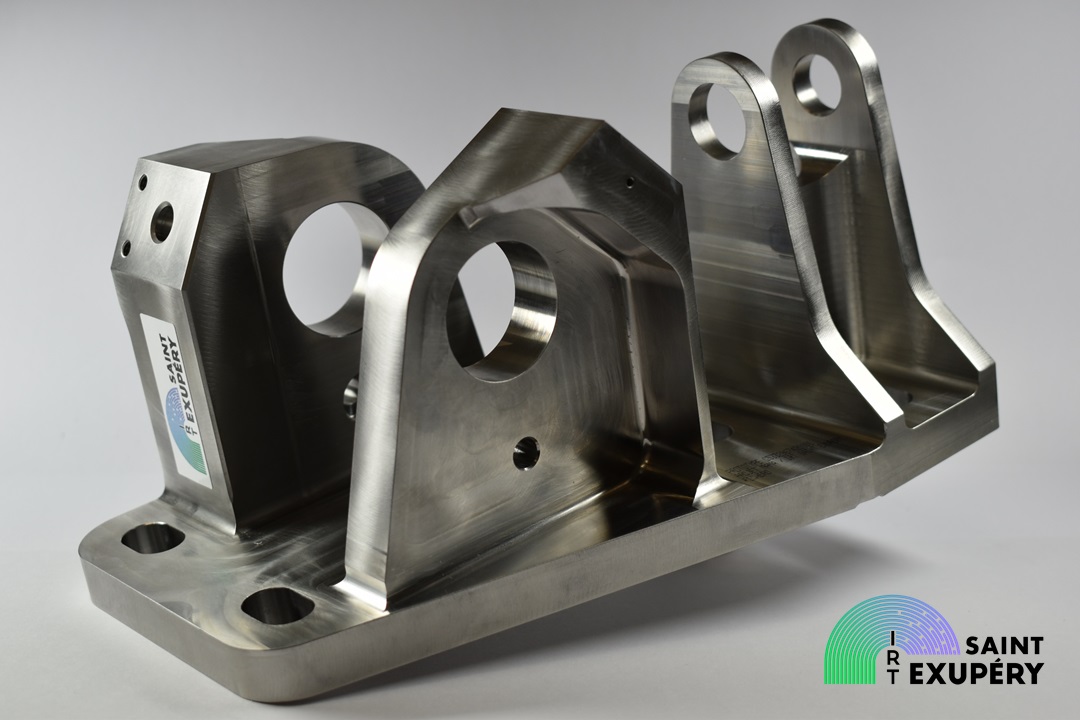The continuing airworthiness of civil and military aircrafts relies on both repair capabilities for damaged parts and the guaranty to quickly deliver spare parts all along the life cycle of an avionics programme. In this respect, the flexibility offered by the additive manufacturing technologies provides support for the needs of the MRO market as well as for the production of new components using the same industrial equipments. At the same time, the additive manufacturing also operates as a powerful lever arm when it comes to relocate employment, to reduce lead-time and to get rid of some constraints relative to raw material supply.
Within a tense global context relating to metal production, the multiplicity of avionics programmes and metallic alloys being used by OEMs requires suppliers to feature costly storage capacities and complex logistic supply chains to secure the availability of plate or long metal products to elaborate brand new components. Therefore, some product sourcing can be tricky especially for former alloy grades or strategic materials soon subjected to issues of sovereignty.
In the scope of the MAMA research project, IRT Saint Exupéry and RECAERO companies respectively located in Toulouse and Pamiers (France) tackled such challenges through the manufacturing of a bracket for the Airbus’s “Beluga” super-transporter (A300-600ST).
This complex part, subjected to fatigue mechanical stresses, is conventionally machined from a 82 kg round bar of X6CrNiCu15-5 hardenable stainless steel (15-5PH). A long time delivery associated to a minimum order quantity and calling for a significant storage capacity involves financial fixed assets that damage the competitiveness of the company in the end.
The alternative approach based on the additive manufacturing consists to product a near-net-shape bank through a 5-axis CAM programing to operate the LMD-powder machine located on the IRT Saint Exupéry’s platform. From then on, about ten providers can easily and immediately ensure the availability of 15-5PH steel powder. Moreover, the major advantage of filler metal in a pulverulent state lies in a drastic rationalisation of stocks whether it is question of volume or number of references. Indeed, powder allows without distinction to operate a repair, a function adding or to create a blank to be machined regardless of the dimensions and the design. And better yet, the approval of customers (i.e. aircraft manufacturers and airline companies) and aviation authorities could simplify the materials catalogue in the future by switching from outdated and unavailable alloys to most performing and universal ones.
Beyond the security of raw materials supply, additive manufacturing allows in this example to feature a 14 kg blank in just over ten hours of production and so to limit the total weight of required material. This frugal approach eloquently matches with current requirements to decarbonise the aviation industry because the initial 13,7 by-to-fly ratio is reduced to 2,4. Last, the machining stage on a 5-axis CNC machine is 40% shortened allowing substantial energy and cutting tools savings.
In the end, the flexibility offered by the additive manufacturing helps to get rid of the storage of huge amount of raw materials in order to ensure the production of spare parts, within short deadlines, resulting in the improvement of the serviceability rate of civil and military aircrafts. By securing the supply chain, the additive manufacturing reinforce the service offering and the competitiveness of businesses in the aviation industry while responding effectively to the stakes of their environmental and social responsibility.
ABOUT MAMA PROJECT
“The industrial objectives are to significantly reduce recurring manufacturing costs, reduce the volume of raw materials used, and develop solutions for repairing aeronautical parts with very high added value. The project also contributes to a significant reduction in the environmental footprint of the aircraft manufacturing industry.“
Starting in 2018, the IRT Saint Exupéry carries out the MAMA project which aims to reduce the manufacturing costs of primary aerostructure parts and strengthen the economic competitiveness of the French industry in the field of aeronautical construction.
In April, 2022, an 800 mm long titanium Ti64 demonstrator corresponding to a scale 1:1 section of an Airbus A350 fuselage frame was unveiled. It demonstrated a reduction of more than 30% in the amount of raw material used in closed die-forging compared with the current industrial solution.

Download our MAMA press kit – April 2022 (FR)
KEY INFORMATION
Key numbers
Duration of the project: 5 years (August 2018 – July 2023)
Budget: 10.4M € (partially financed by the PIA and the Occitanie Region)
Members: 11
Industrial members
Airbus, Aubert & Duval, IRT Saint Exupéry, Mecaprec, OPT’ALM, Recaero, Sciaky


